If You Want a Great Low-Carb Snack, Start With These Fruits
15 delicious low-carb fruits including apples, blueberries and watermelon.
Fruit is top of mind (and palates) during the summer months. And while the body can always benefit from its wealth of health benefits, the cold winter months are when the body really needs a fruit boost. As we transition into low temps and shorter days, we’re more susceptible to viruses, including the flu, which is spiking in many parts of the country right now.
With its antioxidants, fiber and range of vitamins, fruit is especially beneficial to the immune system. Some people eschew fruit because of its sugar and carb content, but Alex Caspero, RD, a registered dietitian at Delish Knowledge, says that this would be a mistake, as there are tons of low-carb fruit options out there. “This is known as the "fruit obesity paradox:" Individuals with higher fruit consumption actually have lower body weights than those with lower consumption,” she says.
Related: Looking to Lose Weight? Get Started With These 40 Expert and Science-Backed Foods and Drinks
Registered dietitian Dana Angelo White, RD, agrees. “There is no reason to shy away from a healthy, whole fruit,” she says. “In addition to offering a wide range of nutrients like potassium and vitamins A and C, fruit also contains fiber which slows down the digestion of natural sugars. It is true that some fruits contain more fiber than others and a higher or lower fiber may be a better choice for an individual depending on when they eat it or what they are eating it with.”
If you are being mindful of your carbohydrate intake, there are plenty of low-carb fruits to enjoy. Rounded up here are the lowest-carb fruits, which are still packed with nutrient density, including vitamins that can help support a healthy immune system.
15 Low-Carb Fruits
1. Watermelon
Watermelon only has 28 calories per cup—it’s hard to get much lower than that! It also only has 7.5 grams of carbohydrates per serving. White points out that, as its name implies, it’s super hydrating; in fact, watermelon is 92 percent water. Hydration is still important during winter, so keep this fruit front of mind.
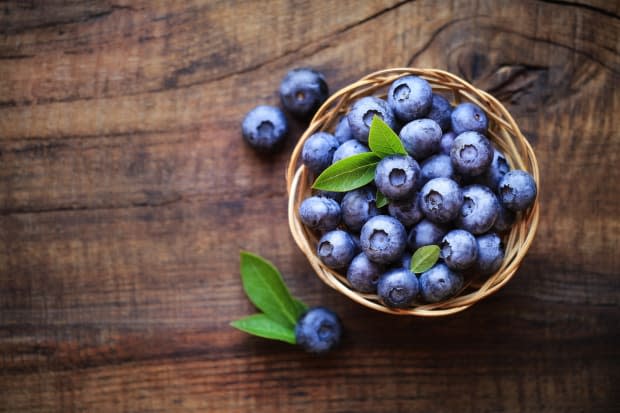
iStock
2. Blueberries
Want to eat something every day that directly supports your brain? Registered dietitian Sonya Angelone, RD, says to include blueberries in your diet. “Blueberries have natural antioxidants and can reduce inflammation. They have been shown to protect the brain and improve brain function,” she says. Angelone says that about a cup of blueberries a day can help with memory, and they have also been found to lower the chances of developing dementia later in life. All of those benefits for just 84 calories and 14.5 grams of carbohydrates per serving? We'll take it.
Related: 11 Foods That are Good for Your Brain
3. Blackberries
Blackberries are another low-carb fruit, with 10 grams of carbohydrates per cup. Like blueberries, all three dietitians say that they’re also high in antioxidants, which benefits both the brain and the heart. There is also some scientific evidence that eating them regularly can help prevent bone loss.
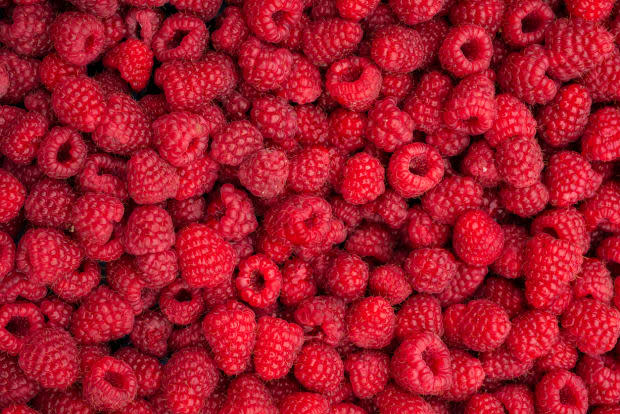
iStock
4. Raspberries
Raspberries are more tart and sweet than blackberries or blueberries, and they bring the same benefits to the table. All three dietitians say that this is yet another berry that’s high in antioxidants, which can help prevent chronic inflammation, benefitting the entire body—especially the brain and heart.
5. Pears
When it comes to gut health, pears are a particularly good choice. White says that they’re low in carbs (15 grams per cup) and a good source of fiber. Pair your pears with probiotic-rich yogurt for extra gut health benefits.
Related: These are the 18 Best Foods for Gut Health

iStock
6. Oranges
While you may already know that oranges contain vitamin C, which benefits the immune system, Angelone says that this fruit is also good for heart health. This is because oranges contain a fiber called pectin, which is linked to keeping LDL cholesterol down.
7. Grapefruit
Like oranges, Angelone says that grapefruit is another good source of immune health-supporting vitamin C. She says that this fruit is also a great source of fiber and antioxidants. If you are taking any prescription drugs, however, check with your doctor before eating grapefruit as it can interfere with some medications, such as statins.
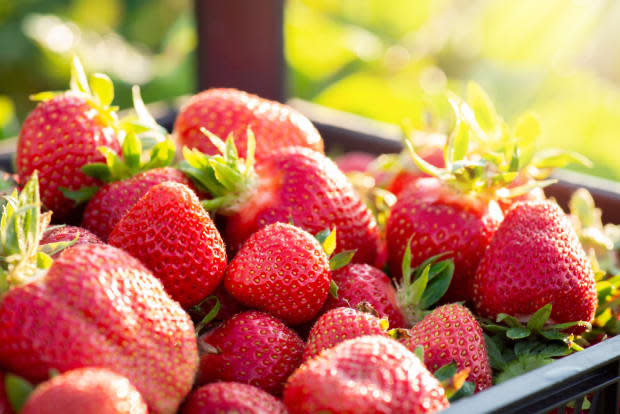
iStock
8. Strawberries
One cup of strawberries has less than 8 grams of carbohydrates and Angelone says that it’s a low-sugar way to get more vitamin C and fiber in your diet. Like other berries, eating strawberries regularly has been scientifically linked to lowering inflammation.
9. Lemon
Angelone recommends using lemon to add both flavor and health benefits to everything from salad and fish to even just water. Like other citrus fruits, lemon contains vitamin C, which supports immune health.
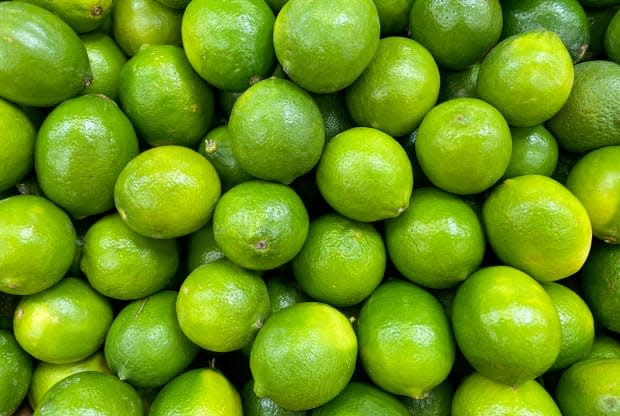
iStock
10. Lime
Limes also have vitamin C and antioxidants, which are especially beneficial this time of year. As with lemon, use lime to add a bright burst of flavor to foods and drinks.
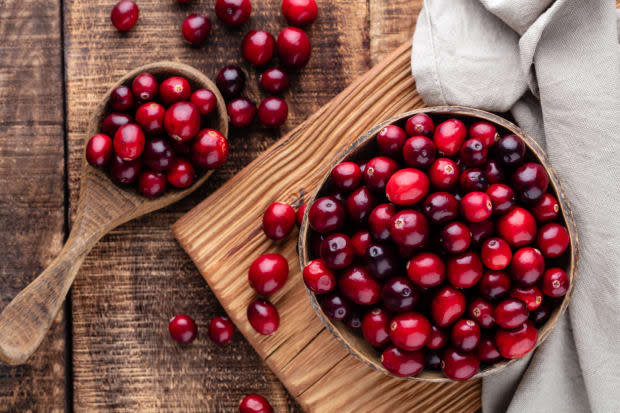
iStock
11. Cranberries
“Cranberries contain prebiotic fiber that supports the growth of beneficial bacteria in the gut,” Angelone says. With only 12 grams of carbohydrates per cup, this tart fruit also has potassium, vitamin C, and vitamin A. “Cranberries are also high in d-mannose, which may help decrease urinary tract infections,” Angelone adds.
12. Pomegranates
Even though pomegranates are low in calories and carbohydrates, they’re high in fiber, which is especially beneficial for gut health. Add them to salads, grain bowls, or oatmeal for a touch of tang.
13. Pineapple
While pineapple isn’t considered a citrus fruit, it’s another great source of vitamin C. It’s also doubly good for the gut; besides fiber, it contains a group of digestive enzymes called bromelain, which helps with digestion.
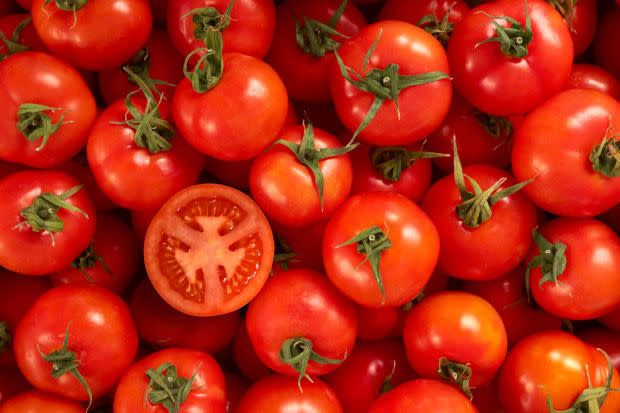
iStock
14. Tomatoes
When it comes to fruit, many people overlook tomatoes, but White says that it’s yet another low-carb option full of benefits. In addition to being high in vitamin C, she says that tomatoes are rich in lycopene, a natural compound that’s good for the heart.
15. Apples
Eating apples regularly can help lower LDL cholesterol and protect against certain types of cancers. No wonder they’re said to keep the doctor away.
As a general rule, all three dietitians say most people can benefit from eating more fruit and not being overly concerned with their calories, carbs or sugar content. “America does not have an obesity problem because we are eating too much fruit. The latest CDC data shows that 90 percent of Americans don't consume enough fruit,” Caspero says. Consider this your sign to add more fruit to your diet, starting with the stellar choices on this list.
Next up, find out what the 20 healthiest vegetables are, according to dietitians.
Sources
Alex Caspero, RD, registered dietitian at Delish Knowledge
Sonya Angelone, RD, registered dietitian
Dana Angelo White, MS, RD, ATC, cookbook author, registered dietitian nutritionist, and certified athletic trainer